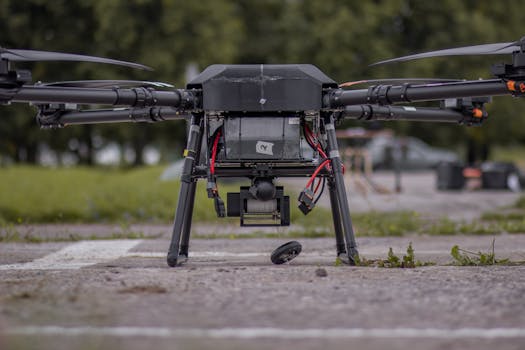You can do a foundation degree or higher national diploma in electrical and electronic engineering.
Entry requirements
You'll usually need:
- 1 or 2 A levels, or equivalent, for a foundation degree or higher national diploma
A Robotics Technician in the UK is a hands-on professional responsible for the installation, maintenance, troubleshooting, and repair of robotic systems and automated machinery. This role is crucial in various industries, from automotive manufacturing and food production to logistics and even healthcare, where robots are used for repetitive tasks, precision operations, or hazardous environments. Your day-to-day could involve diagnosing mechanical, electrical, or software faults, performing preventative maintenance to ensure robots operate efficiently, calibrating sensors and actuators, and occasionally programming or teaching robots new tasks. It's a dynamic role that requires a blend of technical skills, problem-solving abilities, and a keen eye for detail. To excel in this career, you'll need a strong understanding of electronics, mechanics, and computer control systems. Many technicians start with a BTEC, HNC, or HND in engineering fields such as electrical, mechanical, or mechatronics, and some progress to a degree. Apprenticeships are also a popular and highly effective route into this profession, offering practical experience alongside theoretical learning. The work can be demanding, sometimes requiring work at height or in confined spaces, and you'll often be part of a team, collaborating with engineers and production staff to keep operations running smoothly. With the increasing adoption of automation across the UK, the skills of a Robotics Technician are becoming ever more valuable.

The typical salary for a Robotics Technician in the UK ranges from around 25,000 to 40,000 per annum, depending on experience, location, and the specific industry. Highly experienced technicians in specialised fields could earn more.
The field of robotics and automation is experiencing significant growth in the UK. While exact numbers of specific 'Robotics Technician' roles are hard to pinpoint due to varied job titles, the broader 'Mechatronics Engineer' and 'Automation Engineer' categories are projected to grow by approximately 10-15% over the next five years, indicating a healthy demand for skilled technicians.
Estimates suggest there are currently several thousand positions across the UK that involve working with robotic systems, ranging from manufacturing and logistics to healthcare and research. This number is continuously increasing as more industries adopt automation.

Designing, installing, and maintaining automated systems and machinery in various industries. This often involves programming PLCs and SCADA systems, perfect for someone interested in the software side of robotics.

Combining mechanical engineering, electronics, computer engineering, and control engineering to design, develop, and test intelligent products and processes. It's a fantastic blend of all the core elements of robotics.

Focusing specifically on writing code for robots to perform their tasks. This could involve developing AI algorithms, control systems, or user interfaces for robotic systems in fields like healthcare, manufacturing, or logistics.
Focus on Maths, Physics, and IT at A-level or equivalent. These subjects provide the fundamental understanding needed for robotics.
Many colleges offer BTECs in Engineering or Applied Science which can be a great alternative or complement to A-levels, providing a more vocational approach. Understanding core principles in these areas will be crucial for grasping how robotic systems function.
Start building simple electronics projects or get involved with local robotics clubs to develop hands-on skills.
Look for online tutorials for Arduino or Raspberry Pi projects. Even simple circuit building or coding small programmes for microcontrollers can significantly boost your understanding and demonstrate practical aptitude to potential employers or educators. Attending STEM workshops can also be beneficial.
Investigate the different industries where robotics technicians work, such as manufacturing, healthcare, or logistics.
Understanding the diverse applications of robotics can help you tailor your education and skill development. For example, a robotics technician in manufacturing might specialise in industrial automation, while one in healthcare might focus on surgical robots. This early research can help refine your career aspirations.
Pursue a HNC/HND, Foundation Degree, or Apprenticeship in Engineering, Mechatronics, or Robotics.
A Higher National Certificate (HNC) or Diploma (HND) in Electrical, Mechanical, or Manufacturing Engineering provides a strong vocational foundation. Foundation Degrees in Engineering or Mechatronics are also excellent routes. Alternatively, an advanced or higher apprenticeship in an engineering discipline can offer practical, on-the-job training alongside theoretical learning, often leading directly into employment.
Learn about hydraulics, pneumatics, PLCs (Programmable Logic Controllers), and robotic programming languages.
Many vocational courses will cover these topics in depth. You can also explore online courses or certifications in specific areas like PLC programming (e.g., Siemens, Allen-Bradley) or robotic arm programming (e.g., ABB, Fanuc). These specific skills are highly sought after by employers.
Gain practical experience in an engineering or manufacturing environment during your studies.
Look for companies that utilise robotic systems and inquire about short-term placements or summer internships. Even voluntary work experience can provide invaluable insight into the day-to-day role of a technician, allowing you to apply your theoretical knowledge in a real-world setting and build a professional network.
Look for positions such as Junior Robotics Technician, Automation Technician, or Maintenance Technician.
When applying, highlight your technical skills, practical experience, and any projects you've worked on. Emphasise your problem-solving abilities and your eagerness to learn and adapt to new technologies. Many companies offer structured training for new recruits.
Stay updated with new robotic technologies, software, and industry standards through courses and certifications.
The field of robotics is constantly evolving. Attend industry workshops, subscribe to relevant journals, and consider advanced certifications in specific robotic platforms or control systems. This continuous learning will ensure your skills remain relevant and open doors to career progression.
Connect with other professionals, attend trade shows, and join relevant engineering associations.
Building a professional network can lead to new opportunities, mentorship, and insights into industry trends. LinkedIn is a great platform for connecting, and attending events like 'The Manufacturing Technology Centre' (MTC) open days or 'Robotics and Automation Exhibition' can be incredibly valuable for networking and learning.
Explore relevant apprenticeships that can help you kickstart your career in Robotics Technician. Apprenticeships offer hands-on experience and training while earning a wage.
This page showcases various career options and the pathways to reach them. Each career listed here shares transferable skills and knowledge, making it easier for individuals to transition between them.
Your current career is highlighted to help you see how it fits into the broader landscape of potential career choices. By clicking on any career, you can learn more about it, including the training and education required to pursue it.
Remember, progressing in your career often involves further learning and training. This page provides insights into future career options as well as those that can lead up to your current one.
These career progression decisions are informed by comparing the skills and knowledge needed for different occupations, along with data on how people move between them. Explore the possibilities and discover the exciting journey ahead in your career!
Robotics technicians typically require strong electronics knowledge, wiring, circuit troubleshooting, and interfacing with control systems and sensors. The role overlaps with electronics engineering technicians in hardware assembly, diagnostics and testing of electronic subsystems used in automated equipment, making it the closest match among the listed options.
You can get into this job through:
You can do a foundation degree or higher national diploma in electrical and electronic engineering.
You'll usually need:
You could take a college course, which would teach you some of the skills needed for this job.
Relevant courses include:
You'll usually need:
4 or 5 GCSEs at grades 9 to 4 (A* to C), or equivalent, including English and maths for a T Level
You can apply for a place on an apprenticeship to start as a trainee, for example:
You might do a Mechatronics Maintenance Technician Level 3 Advanced Apprenticeship, if you want to work in the service and repair of production line machinery or robotics.
You can also train to be an electronics technician in the Army.
You can apply for a foundation apprenticeship if you're aged 16 to 21.
If you're aged 22 to 24, you can apply if you:
You'll usually need:
You can find out more about courses and careers in engineering from Tomorrow's Engineers and The Institution of Engineering and Technology.
Explore other careers or use our AI to discover personalised paths based on your interests.
Address
Developing Experts Limited
Exchange Street Buildings
35-37 Exchange Street
Norwich
NR2 1DP
UK
Phone
01603 273515
Email
[email protected]
Copyright 2026 Developing Experts, All rights reserved.
Unlock expert-designed lessons, resources, and assessments tailored for educators. No credit card required.
Claim Your Free Trial →